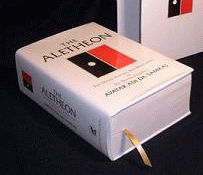
From:
“God As The Creator, God As
Good, and God As The Real”
(pages 107 – 117) From THE ALETHEON
– Adi Da Samra
Excerpt
When the mechanics of egoity are
transcended in “self”-understanding, then it
becomes obvious that life is simply a “play” of
opposites. Neither “Good” nor “Evil”
finally wins.
Conditional Nature, in all its
planes, is inherently a dynamic. The “play” of
conditional Nature, in all its forms and beings and
processes, is not merely seeking the apparent
“Good” of “self”-preservation, nor is it
merely seeking the apparent “Evil” of
“self”-destruction. Rather, the “play”
in conditional Nature is always in the direction of
perpetuating the dynamics of the “play”
itself— and, therefore, polarity, opposition, struggle,
alternation, death, and cyclic repetition tend to be
perpetuated as the characteristics of phenomenal existence.
Therefore, the “play” of conditional Nature is
always alternating between the appearance of dominance by
one or the other of its two basic extremes. And the sign of
this is in the inherent struggle that involves every
conditionally apparent form, being, and process.
The struggle is this dynamic
“play” of opposites, but the import of it is not
the absolute triumph of either half. Things and beings and
processes arise, they move, they are transformed, and they
disappear. No conditionally apparent thing or being or
process is ultimately preserved—nor, by contrast, is
there any absolute destruction. Cosmic Nature is a
transformer—not merely a “creator” or a
“destroyer”.
To the ego,
“self”-preservation may seem to be the inevitable
motive of being. Therefore, a struggle develops to destroy
or escape the dynamic of conditional Nature by dominating
“Evil” with “Good”. This ideal gets
expressed in the generally exoteric and Occidental efforts
to conquer conditional Nature via “worldly
knowledge” and power. However, it also gets expressed
in the generally esoteric and Oriental efforts to escape the
plane of conditional Nature by ascent from materiality to
“Heaven”.
When the ego is understood and
transcended, then conditional Nature is seen in the Light of
Reality Itself. And, in that case, the egoic struggle in
conditional Nature or against conditional Nature is also
understood and transcended. Then life ceases to be founded
on the need to defeat the dynamic of conditional Nature via
conventional “knowledge”, power, immortality, or
mystical escape. The “world” is no longer
conceived as a drama of warfare between “Good” and
“Evil”. The righteousness of the search for the
“Good” as a means of “self”-preservation
disappears along with the “self”-indulgent and
“self”- destructive negativity of possession by
“Evil”. In place of this dilemma of opposites, an
ego-transcending and “world”-transcending
equanimity appears. In that equanimity, there is an Inherent
Self-Radiance That Transcends the egoic dualities of
“Good” and “Evil”. That Self-Radiance Is
the Free Radiance of egoless Love. In That Free Radiance,
energy and attention are inherently free of the ego-bond, or
the “self”- contraction, or the
“gravitational effect” of phenomenal
“self”-awareness. Therefore, dynamic equanimity,
or the free disposition of egoless Love, is the
“window” through which Real (Acausal) God may be
“seen”—not in the conventional mode of
“Creator”, the “Good”, the
“Other”, or the “Heavenly Place”, but as
the Real, the Self- Evidently Divine Self-Nature,
Self-Condition, and Self-State of all-and-All.
The ultimate moment in the
“play” of conditional Nature is not the moment of
egoic success. The ultimate moment is beyond contradiction.
It is the moment of equanimity, the still point in the midst
of the wheel of Nature’s motions and all the
motivations of the born “self”. The Truth—and
the Real Self-Nature, Self-Condition, and Self-State—of
“self” and cosmic Nature is Revealed only in that
equanimity, beyond all stress and bondage of energy and
attention.
“God As The Creator, God As
Good, and God As The Real”
(pages 107 – 117) From THE ALETHEON
– Adi Da Samraj